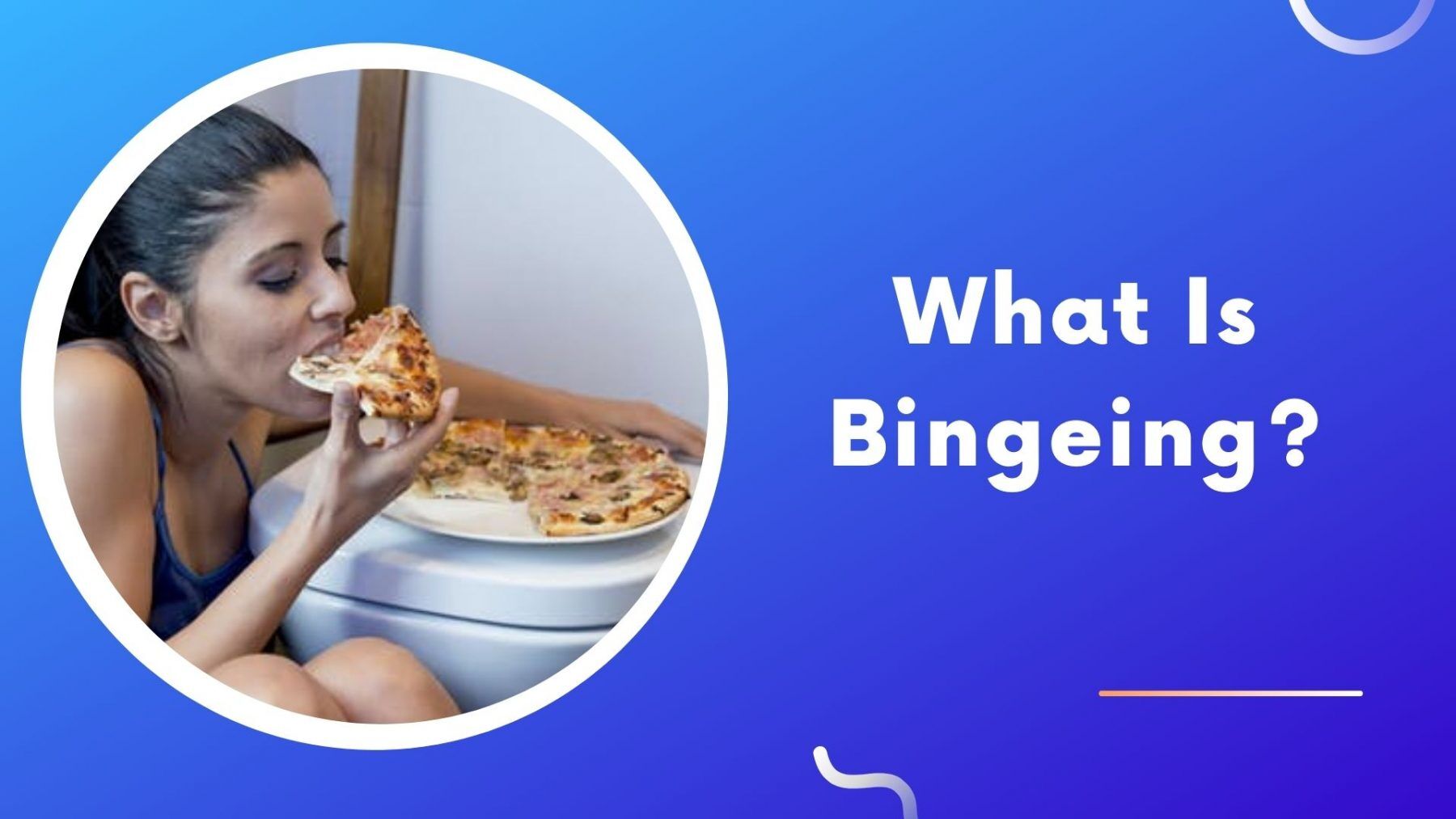Bingeing is a term that has become more and more popular in recent years.
Alcoholics describe their behavior as ‘bingeing’ when they drink an excessive amount all at once.
But bingeing applies not only to drinking, but also to eating food and other behaviors.
Binge eating is subjective too. Some people feel like they binged off just a little bit of food. Others believe a binge only counts if a lot of food gets eaten.
So what is binge eating?
This blog post will talk about the ‘degrees’ of bingeing.
Since ‘bingeing’ is subjective, the precise definition can be elusive.
But we can look at the degrees of bingeing to deepen a holistic understanding of the problem.
That’s what this article is about! So we can deepen our holistic knowledge of bingeing.
So let’s dive in already!
What Does Bingeing Mean?
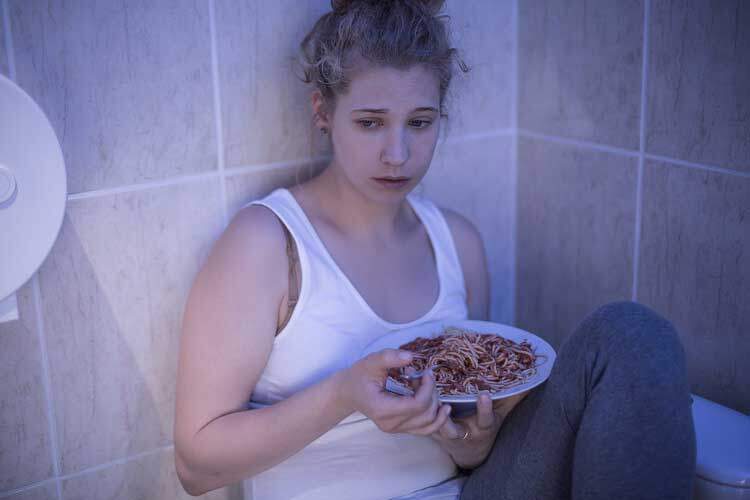
Often people think bingeing refers to just alcohol or food, but you can also binge things like:
- Netflix
- Watching TV
- Video games
And sometimes we go on binges but call them different names!
For example, have you ever been on a shopping ‘spree’?
A spree is a period of time where you spend lots and lots of money. Like after Thanksgiving when we go on spending sprees for clothes or electronics.
Bingeing can mean different things besides literally eating large amounts of food.
I like this layman’s definition of binge to describe the range of behaviors:
Too much of something, a lack of control, and feeling bad afterwards.
Of course we don’t always feel guilty after buying clothing or eating too much food.
For example, just the other day I ate a bit too much food. Hey, it happens to everybody!
But I didn’t feel any guilt or shame! I quickly realized I hadn’t eaten anything that day, so no wonder my body was wanting to eat a large amount of food.
I made a mental note not to forget breakfast and life went on.
In this example I did NOT binge. I ate a lot of food, but I had zero guilt. So no binge.
There Are Many Synonyms!
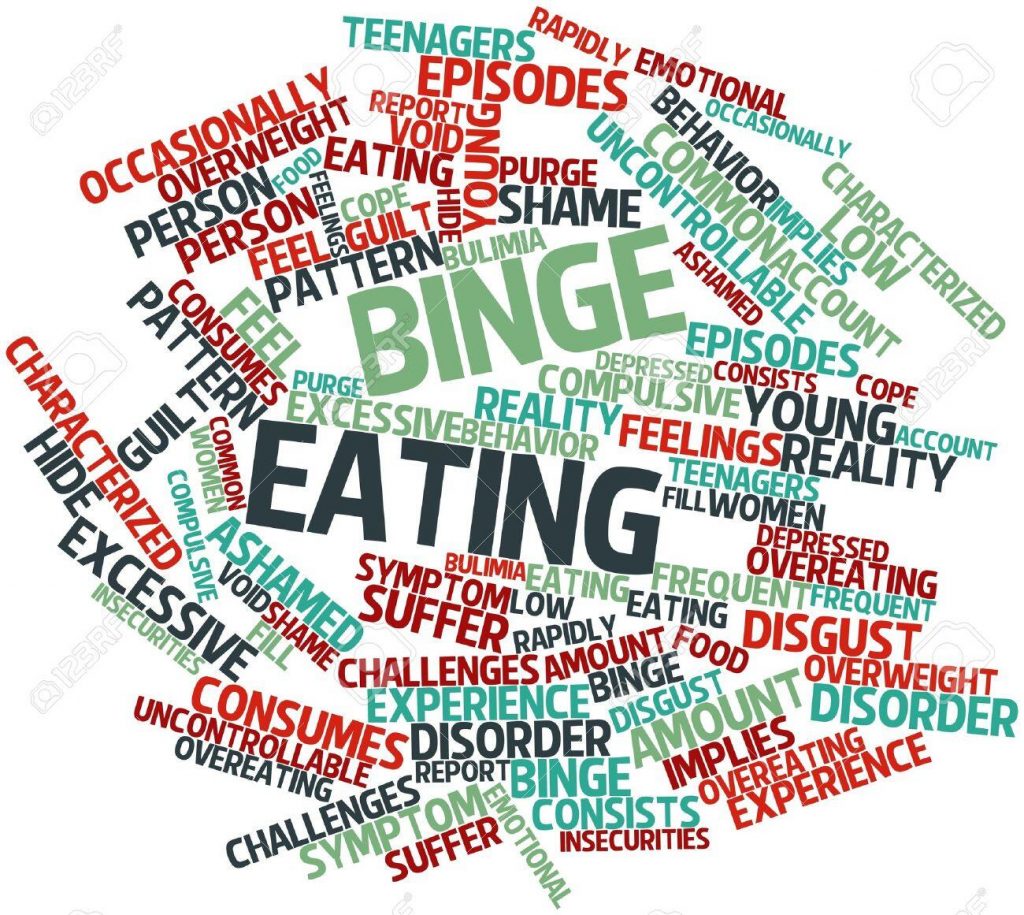
There are so many different names people give their episodes of binge eating!
- Some people might say they ‘had a few too many’ sweets.
- Or what about the time you ‘couldn’t resist’ those French fries at the party?
- Or that last cookie from your co-worker’s birthday sweets pile? The cookie you hid from others because you felt embarrassed? You could’ve been bingeing then, even if it was just one!
Remember, a binge is too much of something and makes you feel bad afterwards.
Even if you just had one extra cookie, if YOU feel bad and think the extra cookie was too much, then it’s a binge.
A binge is subjective.
See, these days I don’t stress out if I have an extra cookie. Today if I eat an extra cookie it’s not a binge.
I am guilt free and don’t beat myself up for eating too much!
But times have changed! I remember feeling a loss of control about eating an extra cookie years ago. I just had to have this cookie no matter what, even though I didn’t feel good about it afterwards!
This single cookie I remember made me toss and turn and get no sleep! All because my inner critic was beating me up because I went a few hundred calories over my limit for the day!
- Back then an extra cookie for me was a binge
- But nowadays the same extra cookie is NOT a binge
Here are some other phrases that mean essentially the same thing as ‘bingeing‘.
- Falling off the wagon
- Getting back on track
- Compulsive overeating
- Food addiction
- Stress eating
Do you see how all these words mean the same thing as ‘bingeing”‘?
For more info on the definition of bingeing, see this National Eating Disorder article here.
Emotional Eating Equals Bingeing
A woman recently told me she ‘emotionally‘ eats sometimes. Emotional eating is a form of bingeing, because you feel guilty after doing it.
But she also stated that she didn’t have Binge Eating Disorder (BED).
And ‘bingeing’ IS indeed DIFFERENT than Binge Eating DISORDER (and other eating disorders, too). We’ll discuss Binge Eating Disorder next.
Binge Eating Disorder (BED)
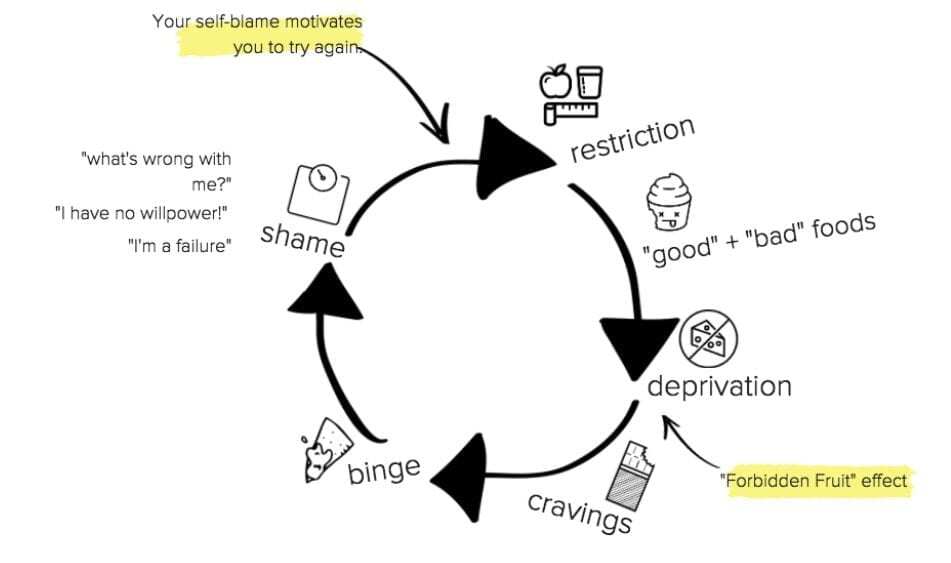
Some people may have what’s called Binge Eating Disorder (BED). BED is one of many eating disorders.
Binge Eating Disorder is a clinically diagnosable disorder, as defined by the Diagnostic and Statistical Manual of Mental Disorders (also known as the DSM-5).
Binge eating episodes are where people repeatedly overeat without stopping themselves. In other words they repeatedly have episodes of binge eating where they consume truly LARGE amounts of food in a short period of time.
People with BED may keep going until their body makes them feel sick or uncomfortable.
BED also involves intense feelings of anxiety, shame and guilt, often sadness and hopelessness.
For more info on BED, see my complete intro guide to Binge Eating Disorder here.
This guide covers the DSM-5 medical definition of Binge Eating Disorder (short for the Diagnostic and Statistical Manual of Mental Disorders)
The guide also talks about treatment of binge eating episodes and BED, and where to learn more if you struggle with binge eating or BED.
What’s the Difference Between Bingeing and Binge Eating Disorder?
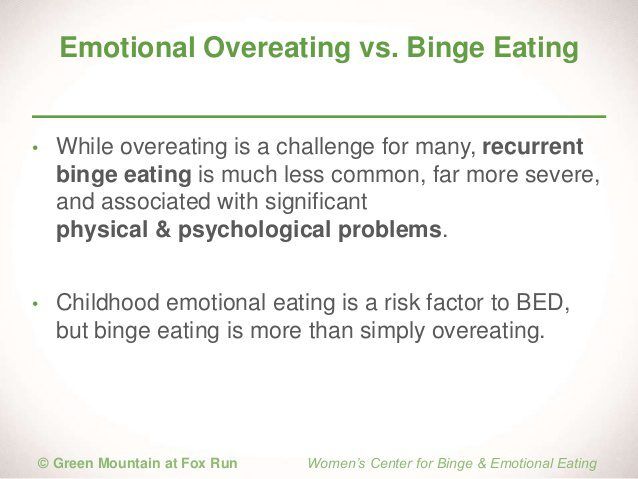
The difference between bingeing and Binge Eating Disorder is that the latter is a mental disorder.
Bingeing can be an act of human nature that’s done to escape from reality or relieve stress. We all have done it before!
For example, you might binge one day, feel a lack of control, and feel guilty.
But then the next day, or another short period of time, you feel alright about yourself. You’ve moved on from your binge and aren’t stuck in the past.
In this situation, you do have a health problem. Bingeing is not healthy at any level of severity.
But bingeing every once in a blue moon and feeling a little guilty is not the same DEGREE as Binge Eating Disorder.
People with Binge Eating Disorder experience:
- tremendous anxiety around when they will binge again
- shame and guilt that lasts for hours or days after a binge
- sadness and hopelessness
- lack of interest in anything other than food/eating
- painful fullness
For BED, the bingeing is not triggered by the circumstances. Binge Eating Disorder is a mental disorder that affects their lives on a daily basis.
The differences between these two are very nuanced so if you have any questions please let me know! I’m happy to help. 🙂
Degrees of BED
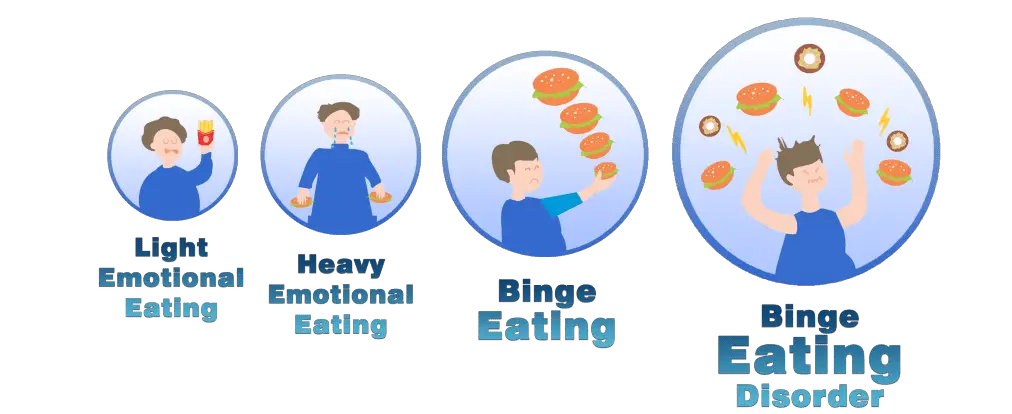
To better grasp what bingeing is, you must think more in degrees:
- Mild bingeing – this degree of binging usually just means someone ate a little bit extra at one sitting. Like having another cookie after dinner or cake for breakfast the next morning.
- Medium bingeing – this means someone ate a little bit too much at one sitting but not enough to be ‘full blown’. It would have felt uncomfortable if they had continued eating, but they didn’t go all the way.
- Severe bingeing – this level of binging is what most people consider ‘bingeing’. This entails large amounts eaten that are more than just slightly overeating. This goes beyond feeling uncomfortably stuffed and:
- includes unhealthy levels of food intake (this can also include alcohol)
- Extremely severe – This is ‘Binge Eating Disorder, the inability to stop eating or overeating. Often includes extreme weight gain and/or other health issues.
- extreme guilt followed by periods without any interest in anything else other than eating
The Signs Of A Binge
Here are some common signs of a binge (we talked about some of these already!):
- Eating large quantities of food in a short space of time
- Overeating by what feels like ‘a lot’ or even more than an extra meal’s worth.
- Feeling guilty, shameful, depressed and/or upset after the binge about what happened
- Skipping meals to make up for the overeating during the binge (e.g., not eating breakfast so that you can eat lunch)
- Feeling disgusted with oneself after the binge
- Inability to stop eating while in the process, even if feeling full already
- Binging with unhealthy foods – such as junk food that’s high in calories, sugar, fats or sodium
- Overeating for emotional reasons – Coping by stuffing when sad feelings are present. This may happen without realizing it.
Real Life Examples of People Who Have Dealt with BED (and How They Overcame It)
This woman says she has struggled with Binge Eating for 40+ years. By discovering her cues/triggers, she ultimately learned to stop binge eating!
This gentleman shares how you can catch your cues using a journal, and how awesome I am as an eating coach!
To wrap up our discussion on bingeing, let’s talk about the spelling of the term!
Is It Binging or Bingeing?
The spelling of bingeing and binging goes both ways. But more commonly bingeing is spelled with an ‘e’.
Originally bingeing was spelled binging. But then Alcoholics Anonymous popularized the term ‘bingeing’ for alcohol.
Since then, bingeing with an ‘e’ has become more common. But there’s no reason you can’t spell it binging either!
Final Thoughts
Binge Eating Disorder is different from bingeing.
It’s a mental illness that requires treatment to overcome it. But you can still be considered a ‘binge eater’ without having the diagnosis of a Binge Eating Disorder.
If you find yourself feeling out-of-control around food and wanting to binge on more than just your favorite junk foods …
Please know we’re here for you!
We have information about professional help for both Binge Eating Disorder and other eating disorders like Bulimia. For more info read about treatment options here.



